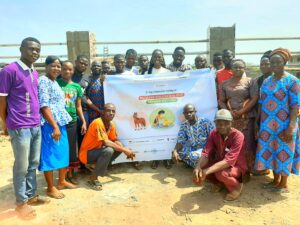
On 14th November, 2020, One Health and Development Initiative (OHDI) held the first training on Animal Welfare and Humane Education with member representatives of small-scale livestock farmers in Pagun Community, Ibadan in Oyo State, Nigeria.
The training started with an opening prayer by Mr. Olajide Odejayi, a farmer and member of the community. This was followed with the introduction of guests, the One Health and Development Initiative (OHDI) team and a brief welcoming address by Mr. Olajide Odejayi, who thanked the OHDI team for bringing an important training which will further enlighten the community in the response to humane education and good animal welfare practices.
After the introduction, Dr. Kikiope Oluwarore-Isedowo, the OHDI Team lead took the baton by further introducing herself, the organization, and what the training entails. She made it known that Pagun Community would be the first recipient in Southwest, Nigeria of the community-based training by OHDI and would further be expanded to other communities
Dr. Kikiope then proceeded witth the first session at 11:30am which was based on “Animal Welfare for Small Animals”. She discussed in details about management, housing, handling and diseases of small pets – especially dogs since it is the most commonly kept pet in the community. She particularly emphasized on the need for pet owners to be able to identify notifiable diseases such as rabies, discussing the need for pet owners to vaccinate and deworm their pets as at when due, which will further protect the animal, the owner and likewise, people around against diseases. She also discussed about the types of food that are fit for pet (and dog) consumption, educating owners on good animal nutrition and balanced diet. After completing her session, numerous questions about small animals were asked which she confidently gave suitable answers.
The second session kicked off shortly after and was anchored by Dr. Dare Morakinyo who taught “Animal Welfare for Livestock Farm Animals”. He discussed majorly on humane treatment and welfare of Sheep, Goats, Poultry, Pig, Rabbits and Cattle as these animals were the most commonly kept in the community for livestock farming. He spoke about the types of management system and feeding required for keeping livestock animals. He ask participants to discuss the different type of feed they give their animals and provided his technical input to their responses.
Another point he raised was by asking participants how conversant they are to the administration of drugs to their animals. This was done to checkmate drug abuse and misuse amongst farmers. He also made it known to them that the non-professional conduct like indiscriminate drug dispensing and administration on their farms are not meant to occur because it is dangerous to the health of the animals and populace when these drugs are not used appropriately. So he advised them to always seek the help of a professional like a certified Veterinarian or Animal Scientist. He also demonstrated on how to handle some animals such as rabbits and poultry birds.
Furthermore, he discussed about transportation of livestock animals from one location to another. He said transportation of livestock animal should be done early in the morning or late in the evening to prevent heat stress on the animals. He also pointed out that farmers should avoid overpopulation to allow proper ventilation and during transportation of animals to a far distance, there should be stopovers for animals to exercise and relax themselves before further embarking on the journey. To round up his session, he enlightened farmers on the need to regularly deworm their animals and also to ensure necessary biosecurity measurements are observed in their farms. Few minutes was set aside for questions and answers.
Dr. Kikiope then facilitated a round-table discussion with the representatives where they discussed the key gaps in animal health and welfare services in the community. It was discovered that the people who provided services to the community were neither veterinary officers nor animal health technicians. However, the farmers trust their services nonetheless. Furthermore, based on their responses, it was discovered that none of the farmers had conducted vaccination or deworming on their animals, neither have they had anyone to provide such services for them. They further mention that every year, they are used to having sudden disease outbreaks and mortality on their farms. They never really understood why it happened but they tried to manage it within their capacity anyway.
In conclusion, the following resolutions were made:
- The OHDI team in Ibadan would be conducting weekly visits to the community (once a week) for consultations and provision of key necessary clinical services for community farmers in Pagun – particularly starting with mass vaccination and deworming of animals.
- That OHDI would establish a community-based animal health service delivery system in which key nominated persons would be selected, trained and deployed as community animal health workers (CAHW) who can provide key basic animal health services on-demand in the community, under the close supervision of qualified veterinarians.
At OHDI, we continue to demonstrate our commitment to ensuring that animal health and welfare is achieved and the One Health approach is implemented to benefit both animals and humans. We appreciate Animal Kind International for supporting this Project PAWN (Promoting Animal Welfare in Nigeria)





